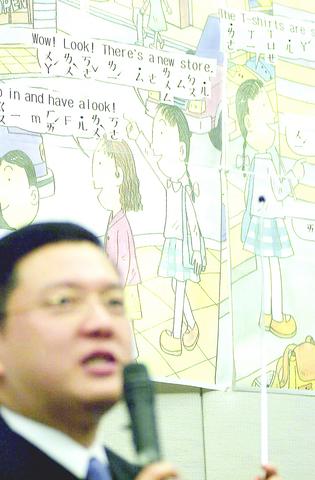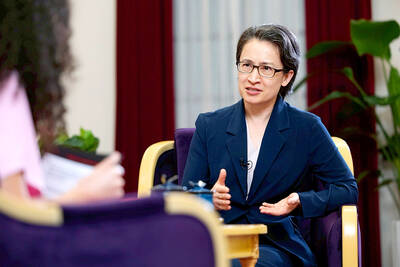Primary school kids are using unwieldy Mandarin phonetics in their English-language textbooks after the Ministry of Education ruled out teaching young pupils KK (Kenyon & Knott) symbols, a lawmaker claimed yesterday.
At a press conference, PFP Legislator Sun Ta-chien (

PHOTO: SEAN CHAO, TAIPEI TIMES
With natural phonetics, students learn English through listening to and speaking the language rather than through memorization and using KK phonetic symbols to pronounce English words.
Sun said that the pupils, unable to memorize pronunciation without the help of KK symbols, marked Bopomofo characters under almost every English word in the textbook.
In one example, the pupil jotted down eight Bopomofo characters and two English letters under the English phrase, "Let's go in and have a look."
Taken phonetically, the sentence read: "Lai Tzu Kou m Hai F Erl Lu Ko" -- far from the correct pronunciation of the sentence, Sun said.
"This is only one example in this pupil's English textbook. Examples like this fill the whole book. The student even reads `and' as `m,'" Sun said.
Pointing at other examples in the book, Sun said, "The way this kid assembles Bopomofo symbols to show English pronunciations is really beyond my imagination."
"The pupil is very inventive. But the reason he has resorted to this method is because he has never been taught KK phonetic symbols," Sun said.
"Without other means to help him pronounce English, he can only use this method," he said.
The ministry decided to adopt natural phonetics in primary schools because it considers KK phonetic symbols too difficult for fifth and sixth-graders to grasp.
Sun said that he is very concerned about the future of the nation's English education because more and more primary school students are learning English using Bopomofo.
"The natural phonetics approach is only effective in English-speaking countries. In those countries, students speak correct English without learning KK phonetic symbols because they practice the language in their daily lives," Sun said.
"But Taiwan is not an English-speaking country. Students forget the pronunciations after classes. Why should we copy the teaching methods of English-speaking countries? It is simply unrealistic," Sun said.
Arjay Lin (
"I try very hard to ask my pupils to read aloud after me in every class. We only have one hour for English every week. As we don't teach KK phonetic symbols, most students forget the pronunciations after class," he said.
Deniro Lin (
According to Deniro Lin, the English proficiency of his first-grade students has polarized.
Those who can afford to attend private language schools find KK phonetic symbols boring, whereas students who have never learned the symbols hardly know how to pronounce English, Deniro Lin said.
Meanwhile, Chen Ming-yin (

Temperatures in northern Taiwan are forecast to reach as high as 30°C today, as an ongoing northeasterly seasonal wind system weakens, the Central Weather Administration (CWA) said. CWA forecaster Tseng Chao-cheng (曾昭誠) said yesterday that with the seasonal wind system weakening, warmer easterly winds would boost the temperature today. Daytime temperatures in northern Taiwan and Yilan County are expected to range from 28°C to 30°C today, up about 3°C from yesterday, Tseng said. According to the CWA, temperature highs in central and southern Taiwan could stay stable. However, the weather is expected to turn cooler starting tonight as the northeasterly wind system strengthens again

The Ministry of Foreign Affairs (MOFA) yesterday expressed “grave concerns” after Singaporean Prime Minister Lawrence Wong (黃循財) reiterated the city-state’s opposition to “Taiwanese independence” during a meeting with Chinese Premier Li Qiang (李強). In Singapore on Saturday, Wong and Li discussed cross-strait developments, the Singaporean Ministry of Foreign Affairs said in a statement. “Prime Minister Wong reiterated that Singapore has a clear and consistent ‘one China’ policy and is opposed to Taiwan independence,” it said. MOFA responded that it is an objective fact and a common understanding shared by many that the Republic of China (ROC) is an independent, sovereign nation, with world-leading

COOLING OFF: Temperatures are expected to fall to lows of about 20°C on Sunday and possibly 18°C to 19°C next week, following a wave of northeasterly winds on Friday The Central Weather Administration (CWA) on Sunday forecast more rain and cooler temperatures for northern Taiwan this week, with the mercury dropping to lows of 18°C, as another wave of northeasterly winds sweeps across the country. The current northeasterly winds would continue to affect Taiwan through today, with precipitation peaking today, bringing increased rainfall to windward areas, CWA forecaster Liu Pei-teng (劉沛滕) said. The weather system would weaken slightly tomorrow before another, stronger wave arrives on Friday, lasting into next week, Liu said. From yesterday to today, northern Taiwan can expect cool, wet weather, with lows of 22°C to 23°C in most areas,

DEFENDING FREEDOM: Taiwanese love peace and helping others, and hope to be a positive force in the world, Vice President Hsiao Bi-khim told ‘Weltspiegel’ Taiwan is making every effort to prevent war in the face of China’s hybrid coercion tactics and military threats, Vice President Hsiao Bi-khim (蕭美琴) said in an interview with German public broadcaster ARD’s program Weltspiegel that aired on Monday. Taiwan is not seeking provocation or intending to disrupt international order, but “must possess the capacity for self-defense,” a news release issued by the Presidential Office yesterday quoted her as saying. Taiwan is closely watching not only the increasing scope and frequency of Chinese military exercises around the nation, but also Beijing’s hybrid and cognitive warfare tactics, including manipulating public opinion, fostering